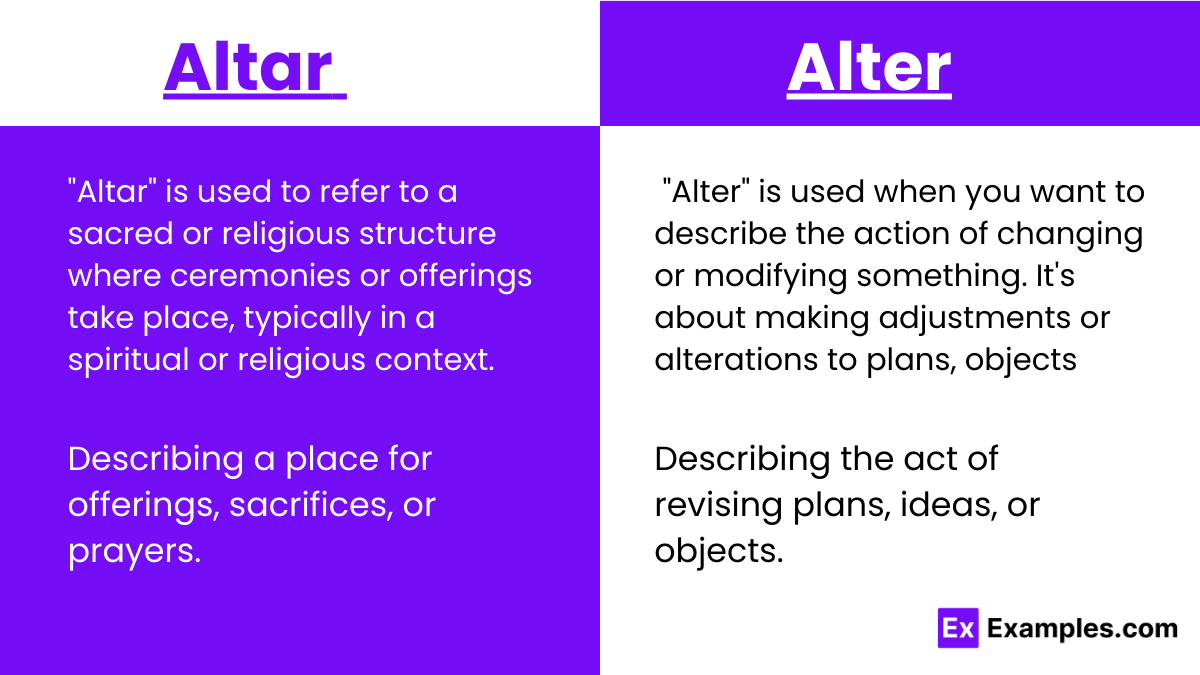Altar vs Alter
The exploration of “Altar” vs. “Alter” unveils the captivating realm of homophones in the English language, where two words share the melody of pronunciation yet dance to entirely different tunes of meaning. “Altar,” a noun deeply rooted in religious and ceremonial contexts, stands as a symbol of sanctity and spiritual reverence, often serving as the focal point in places of worship where individuals converge to honor and connect with the divine. This term carries with it centuries of traditions, embodying the physical space where the human and the sacred meet.
Conversely, “Alter” is a verb that flows through the currents of change, embodying the act of making something different, whether it’s a slight modification or a profound transformation. It speaks to the dynamic nature of life and the incessant flow of evolution that touches ideas, objects, and even personal paths. As students delve into the depths of these words, they embark on a linguistic journey that not only sharpens their vocabulary but also enriches their understanding of the nuanced tapestry that language weaves, illustrating how every word holds a world of meaning waiting to be discovered.
Altar and Alter – Meanings
Altar: Altar refers to a sacred table or platform used in religious rituals and ceremonZies, serving as a pivotal point in various acts of worship across different cultures and religions. Typically found in churches, temples, and other places of worship, an altar is often associated with offerings, sacrifices, and prayers, symbolizing a space of divine communication and spiritual reverence. Its presence underscores the sanctity of religious practices, acting as a bridge between the mortal and the divine, where believers gather to express their faith, seek solace, and celebrate sacred traditions, making it an integral element of spiritual life.
Alter: Alter on the other hand, signifies the act of change or modification, encompassing a wide range of adjustments from minor tweaks to substantial transformations. It embodies the concept of variability and adaptability, reflecting the fluidity of circumstances, perspectives, and conditions. To alter something is to embark on a process of transition, be it altering a piece of clothing to fit better, altering a plan due to unforeseen circumstances, or altering one’s mindset for personal growth. This verb encapsulates the dynamic nature of existence, highlighting the continual evolution and the potential for reinvention inherent in the fabric of life.
Summary
The term “altar” denotes a consecrated spot central to spiritual observances, symbolizing a nexus of earthly and divine communion across varied religious landscapes, often marked by rituals of devotion, offerings, and supplication. It serves as a core element in sacred spaces like churches and temples, facilitating a communal expression of faith and spirituality. In contrast, “alter” represents the process of modification or change, ranging from minor adjustments to profound shifts. It speaks to the malleability of existence and the ongoing journey of adaptation and transformation, whether in personal growth, plans, or physical alterations, highlighting life’s intrinsic capacity for change and development.
Difference Between Altar and Alter
Exploring “Altar” versus “Alter” reveals distinct differences between these homophones, from meaning to usage.
| Aspect | Altar | Alter |
|---|---|---|
| Definition | Sacred platform or table | To change or modify |
| Part of Speech | Noun | Verb |
| Usage | Religious contexts | General contexts |
| Purpose | Worship and ceremonies | Making changes |
| Association | Spirituality and devotion | Change and modification |
| Location | Churches, temples | Any context |
| Action | None (static object) | Action required |
| Synonyms | Shrine, sanctuary | Modify, adjust |
| Common Context | Religious rituals | Everyday situations |
| Example | Praying at the altar | Alter a plan |
Examples of Altar and Alter
Distinguishing “Altar” from “Alter” is essential for precise language use. Here are examples to illustrate their distinct applications:
Altar Examples:
- The couple exchanged vows at the church altar.
- Incense burned on the temple’s altar during the ceremony.
- The ancient altar was discovered during the archaeological dig.
- Flowers adorned the altar for the holiday service.
- The priest approached the altar to begin the mass.
Alter Examples:
- She decided to alter her wedding dress for a better fit.
- The architect needed to alter the plans to comply with regulations.
- Unexpected weather conditions forced them to alter their travel itinerary.
- The teacher had to alter the lesson plan due to time constraints.
- New information led the detective to alter his perspective on the case.
When to Use Altar and Alter
Choosing between “Altar” and “Alter” depends on the context:
-
Usage of “Altar”
- Referring to a sacred table or platform in religious settings.
- Discussing a focal point for worship or ceremonial rituals.
- Describing a place for offerings, sacrifices, or prayers.
-
Usage of “Alter”
- Indicating a change or modification to something.
- Discussing adjustments, whether minor tweaks or major transformations.
- Describing the act of revising plans, ideas, or objects.
FAQs
What Is a Biblical Alter?
The term “biblical alter” is a common misspelling. The correct term related to biblical contexts is “altar,” referring to a sacred place for offerings and worship in religious texts.
Is the Word Altar in the Bible?
Yes, the word “altar” appears numerous times in the Bible, signifying a sacred structure where offerings and sacrifices are made to God in both the Old and New Testaments.
Is It Alter or Altar Boy?
The correct term is “altar boy,” referring to a young male assistant who serves in various capacities during religious services, particularly in Christian churches.
Why Is the Altar Sacred?
The altar is considered sacred because it is the focal point of religious ceremonies, symbolizing God’s presence, divine worship, and the place where sacrifices and offerings are made, reflecting deep spiritual significance





